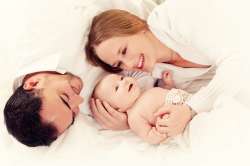Want to live longer? Have kids, says study
If you are one of those who are finding ways to increase lifespan, then you will be delighted to know that having kids may hold the key to long life, a new study revealed. The

If you are one of those who are finding ways to increase lifespan, then you will be delighted to know that having kids may hold the key to long life, a new study revealed.
The findings suggested that the risks of death were lower among those who had had at least one child than they were among those who were childless -- and more so among men than among women -- and were not affected by the sex of the child(ren).
"We started first at the age of 60 and we looked all the way up to the age of 100," Karin Modig from Karolinska Institute Sweden was quoted as saying by guardian.com.
At age 60, the difference in the one-year risk of death was 0.06 per cent among men and 0.16 per cent among women.
The one-year risk of death for an 80-year-old man with a child was 7.4 per cent, for example, compared with 8.3 per cent for a childless man of the same age.
The gap in absolute death risks between the two groups rose with increasing age, and was somewhat larger for men than it was for women.
By the age of 90, these differences had risen to 1.47 per cent among men and to 1.10 per cent among women.
Further, the difference in death risk was 1.2 per cent among unmarried men and 0.6 per cent among those who were married.
"Our finding that the association grew stronger when parents became older is further in agreement with study suggesting that childless people face support deficits only towards the end of life," the researchers noted, in the paper published online in the Journal of Epidemiology & Community Health.
For the study, the team tracked the lifespan from the age of 60 onwards of all men (704,481) and women (725,290) in Sweden.
(With IANS Inputs